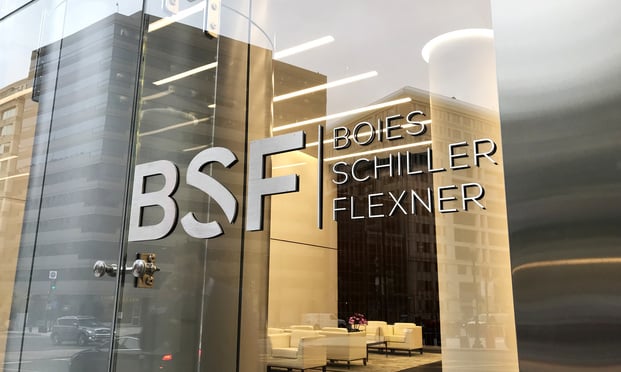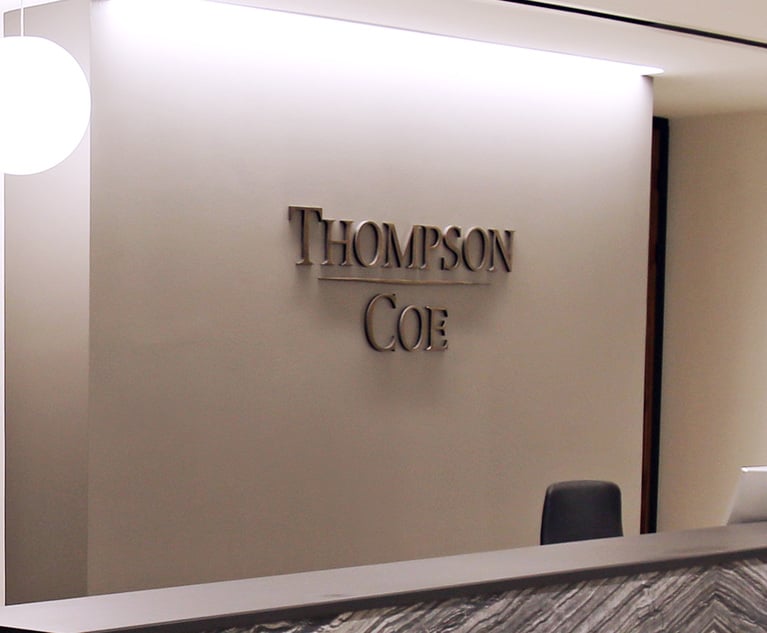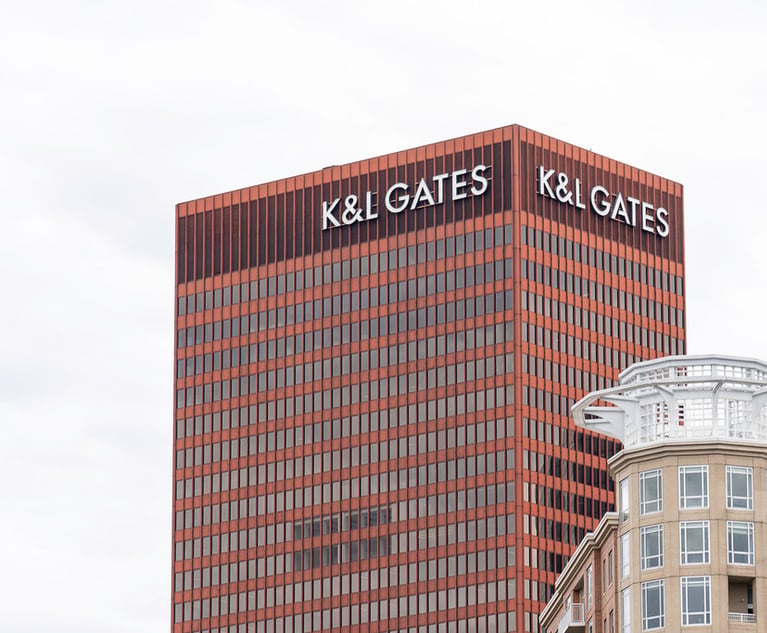Uncertainty Looms Over Boies Schiller After Dunn and Isaacson's Exit
The work generated by Bill Isaacson and Karen Dunn, and a group of departing West Coast partners, could be as much as $100 million in business—nearly a quarter of the firm's 2019 gross revenue.
June 14, 2020 at 06:30 PM
7 minute read
 Boies Schiller Flexner offices in Washington, D.C. Photo: Diego M. Radzinschi/ALM
Boies Schiller Flexner offices in Washington, D.C. Photo: Diego M. Radzinschi/ALM
The departure of executive committee members Bill Isaacson and Karen Dunn comes as perhaps the most damaging single blow to Boies Schiller Flexner, contributing even more uncertainty over how it charts its path forward, several sources familiar with the firm said.
Few in the firm had as much client business, or the kind of top-tier client reputation, as Washington, D.C.-based Dunn and Isaacson, who left for Paul, Weiss, Rifkind, Wharton & Garrison on June 11.
"It's devastating. It will accelerate Boies Schiller's shrinkage to really a small slice of what it once was," said one former partner about the pair's exit.
According to information provided by sources, the work generated by Isaacson and Dunn, as well as a group of West Coast partners who left this year, could be as much as $100 million in yearly combined business—or nearly a quarter of the firm's $400 million gross revenue in 2019.
That's not to mention revenue generated by other partners who left this year, such as Kathleen Hartnett, who is now leading the Cooley legal team in several ongoing lawsuits with Facebook, according to court records. Boies Schiller, which has 13 office locations, saw a 3.6% decline in revenue last year.
As one former partner said, a picture of the firm's long-term future, beyond the presence of founding partners David Boies and Jonathan Schiller, is unclear, unless the firm were to merge or make a string of lateral hires.
With Dunn and Isaacson gone, the attorneys who wield similar books of business left at the firm are Boies, Schiller, managing partners Nick Gravante and Natasha Harrison, as well as Fort Lauderdale-based partner Stuart Singer, sources say.
In a statement to Law.com, Boies Schiller strongly denied the $100 million figure, adding that "the vast majority of the most profitable business remains with the firm," and that revenue per lawyers and profits per partner will increase as the result of the departures.
Three sources say Dunn and Isaacson's departures mark an effective end in the firm's high-powered presence in Washington, D.C. The region has seen a steady stream of partner departures: Stacey Grigsby, Lee Wolosky, Michael Gottlieb and, this month, former U.N. ambassador David Pressman. And while it still boasts 23 D.C.-based partners, according to its website, the only partner with any significant practice is Robert Cooper, one of the administrative partners of Boies' D.C. office, per one source.
Those close to firm attorneys say more are in the process of leaving.
The blow to the D.C. office along with the 15 partners who decamped to King & Spalding from the firm's San Francisco and Los Angeles offices in April mean Boies Schiller has suffered in two significant markets this year. All told, the firm has lost 11% of its total head count and 24% of its partnership in the last six months, according to ALM data.
In its statement, Boies Schiller confirmed there will be more exits. The firm said that a number of the departures "were expected and planned for" as part of a firmwide restructuring that will allow the firm to "evolve, adapt and ensure that we are ahead of the curve."
"At times, that is not easy, but we are going to do it," Gravante said in a statement.
The firm highlighted the recent hires of Lauren Bell, senior counsel to the head of the U.S. Justice Department's criminal division, and John Kucera, a federal prosecutor in California — adding that more hires will be announced in the future.
"In its almost twenty-five years, the firm has a distinguished record of recruiting and cultivating some of the most sought-after lawyers in the market. We are continuing to attract and recruit some of the best lawyers in the country," a firm spokesperson said in a statement.
Boies Schiller also announced that Fort Lauderdale partner Sigrid McCawley, New York partner Matt Schwartz, and Cooper have been elevated to the executive committee.
"They are brilliant, collegial lawyers who represent the future of the firm," Gravante said.
Business Ties
Isaacson, an original member of the 1997 Boies Schiller partnership, and Dunn, a leading voice for the next generation of the firm, declined to comment beyond remarks made this past week on why they left Boies Schiller.
Several sources said many of the 30-plus partners who have left the firm since December had lost faith in Boies himself and the leadership of Gravante and Harrison.
According to these sources, the firm was opaque on key financial information, even among executive committee members. Boies' controversial representations of sex offender Harvey Weinstein and defunct company Theranos made clients uneasy, they said. And, despite the airing of these grievances, firm leadership was too slow or unwilling to make changes, these sources said.
The latest departures are almost certainly a financial hit to Boies Schiller. Four sources with knowledge of the firm place Dunn and Isaacson's book of business at around $50 million, although the nature of Isaacson's antitrust practice fluctuates year over year.
The attorneys have close ties to high-billing clients such as Apple, Oracle, the Ultimate Fighting Championship and Amazon founder Jeff Bezos, according to several sources with knowledge of the attorneys, in addition to federal court records.
Since 2014, Apple has turned to Isaacson for a variety of matters. He and Dunn secured a big win for Apple in an antitrust lawsuit that alleged that a new update raised costs for consumers looking to switch devices. That same year, the UFC turned to Isaacson to defend it against an antitrust lawsuit of its own.
Dunn, for her part, has a vibrant crisis management practice and now has several top-ranked crisis attorneys in colleagues at Paul Weiss including Ted Wells and firm chairman Brad Karp. She helped lead the defense of Uber in a multimillion-dollar suit brought on by Google subsidiary Waymo.
Dunn and Isaacson have led multiple defenses together for Apple and secured a $124 million judgment on behalf of Oracle in 2015.
A source added that Uber may not go to Paul Weiss. Former Boies Schiller partner Grigsby, who left the firm's Washington, D.C., office to join Covington & Burling in April, has a close relationship with Uber and general counsel Tony West, who said in April that he would continue to send work to her.
A Path Forward
Law firms can still go on as they were, even if they experience a wave of departures from critical partners and big groups, said Kristin Stark, a principal at Fairfax & Associates. The firms can survive if the leadership can admit its own mistakes and rally the remaining partners together on a plan that everyone backs, she added.
"I have seen firms lose more than 10% of their revenue. It is hard. The larger the percentage, the harder it is," Stark said.
But it might be too late for a big firm to continue—without a major structural transformation—if the losses are too large, and the remaining partners either can't agree on a path forward or have too much animosity toward each other, Stark said. Complicating a firm's potential recovery from these kinds of departures is the number of offices it has.
"Typically, the situations where firms do survive, they tend to be smaller firms with fewer lease obligations. When firms are larger and have more lease obligations and they lose partners across a swath of their geography, that's very challenging," Stark said. "It's harder to keep the glue together of those who are remaining because they're spread out, but the lease obligations are very expensive."
A previous version of this story incorrectly stated that Isaacson worked on the Waymo-Uber case. It has been corrected.
Read More
Boies Schiller Flexner to Replace Associate Formula Bonus System With Market Rate Scheme
This content has been archived. It is available through our partners, LexisNexis® and Bloomberg Law.
To view this content, please continue to their sites.
Not a Lexis Subscriber?
Subscribe Now
Not a Bloomberg Law Subscriber?
Subscribe Now
NOT FOR REPRINT
© 2025 ALM Global, LLC, All Rights Reserved. Request academic re-use from www.copyright.com. All other uses, submit a request to [email protected]. For more information visit Asset & Logo Licensing.
You Might Like
View All
KPMG Wants to Provide Legal Services in the US. Now All Eyes Are on Their Big Four Peers



K&L Gates Sheds Space, but Will Stay in Flagship Pittsburgh Office After Lease Renewal
Law Firms Mentioned
Trending Stories
- 1Legal Advocacy for Public Health
- 2Dispute Resolution in Challenging Times
- 3AI Disclosures Under the Spotlight: SEC Expectations for Year-End Filings
- 4Attorney Sanctioned $9K for Revealing Nude Photos, Other Info in Court Filing
- 5Shifting Battlegrounds in Administrative Law, From Biden to Trump II
Who Got The Work
Michael G. Bongiorno, Andrew Scott Dulberg and Elizabeth E. Driscoll from Wilmer Cutler Pickering Hale and Dorr have stepped in to represent Symbotic Inc., an A.I.-enabled technology platform that focuses on increasing supply chain efficiency, and other defendants in a pending shareholder derivative lawsuit. The case, filed Oct. 2 in Massachusetts District Court by the Brown Law Firm on behalf of Stephen Austen, accuses certain officers and directors of misleading investors in regard to Symbotic's potential for margin growth by failing to disclose that the company was not equipped to timely deploy its systems or manage expenses through project delays. The case, assigned to U.S. District Judge Nathaniel M. Gorton, is 1:24-cv-12522, Austen v. Cohen et al.
Who Got The Work
Edmund Polubinski and Marie Killmond of Davis Polk & Wardwell have entered appearances for data platform software development company MongoDB and other defendants in a pending shareholder derivative lawsuit. The action, filed Oct. 7 in New York Southern District Court by the Brown Law Firm, accuses the company's directors and/or officers of falsely expressing confidence in the company’s restructuring of its sales incentive plan and downplaying the severity of decreases in its upfront commitments. The case is 1:24-cv-07594, Roy v. Ittycheria et al.
Who Got The Work
Amy O. Bruchs and Kurt F. Ellison of Michael Best & Friedrich have entered appearances for Epic Systems Corp. in a pending employment discrimination lawsuit. The suit was filed Sept. 7 in Wisconsin Western District Court by Levine Eisberner LLC and Siri & Glimstad on behalf of a project manager who claims that he was wrongfully terminated after applying for a religious exemption to the defendant's COVID-19 vaccine mandate. The case, assigned to U.S. Magistrate Judge Anita Marie Boor, is 3:24-cv-00630, Secker, Nathan v. Epic Systems Corporation.
Who Got The Work
David X. Sullivan, Thomas J. Finn and Gregory A. Hall from McCarter & English have entered appearances for Sunrun Installation Services in a pending civil rights lawsuit. The complaint was filed Sept. 4 in Connecticut District Court by attorney Robert M. Berke on behalf of former employee George Edward Steins, who was arrested and charged with employing an unregistered home improvement salesperson. The complaint alleges that had Sunrun informed the Connecticut Department of Consumer Protection that the plaintiff's employment had ended in 2017 and that he no longer held Sunrun's home improvement contractor license, he would not have been hit with charges, which were dismissed in May 2024. The case, assigned to U.S. District Judge Jeffrey A. Meyer, is 3:24-cv-01423, Steins v. Sunrun, Inc. et al.
Who Got The Work
Greenberg Traurig shareholder Joshua L. Raskin has entered an appearance for boohoo.com UK Ltd. in a pending patent infringement lawsuit. The suit, filed Sept. 3 in Texas Eastern District Court by Rozier Hardt McDonough on behalf of Alto Dynamics, asserts five patents related to an online shopping platform. The case, assigned to U.S. District Judge Rodney Gilstrap, is 2:24-cv-00719, Alto Dynamics, LLC v. boohoo.com UK Limited.
Featured Firms
Law Offices of Gary Martin Hays & Associates, P.C.
(470) 294-1674
Law Offices of Mark E. Salomone
(857) 444-6468
Smith & Hassler
(713) 739-1250










